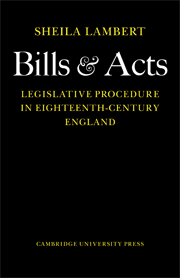Book contents
- Frontmatter
- Contents
- Preface
- Abbreviations
- Introduction
- 1 Robert Harper and parliamentary agency
- 2 Treatises and handbooks
- 3 The clerks: fees and agency
- 4 Parliamentary business
- 5 Private bill procedure
- 6 Estate bills
- 7 Inclosure bills
- 8 Local bills
- 9 Promulgation of the statutes
- 10 Conclusion
- Appendix I List of bills drawn by Robert Harper
- Appendix II Note on parliamentary sources
- Index
4 - Parliamentary business
Published online by Cambridge University Press: 07 October 2011
- Frontmatter
- Contents
- Preface
- Abbreviations
- Introduction
- 1 Robert Harper and parliamentary agency
- 2 Treatises and handbooks
- 3 The clerks: fees and agency
- 4 Parliamentary business
- 5 Private bill procedure
- 6 Estate bills
- 7 Inclosure bills
- 8 Local bills
- 9 Promulgation of the statutes
- 10 Conclusion
- Appendix I List of bills drawn by Robert Harper
- Appendix II Note on parliamentary sources
- Index
Summary
Mr Hatsill [sic] writes to me that above 360 private petitions have been presented for Bills, being above fifty more than in the last Session, and three times as many as the average twenty years ago. He attributes this to the superaccretion of wealth; and, at the same time, the bankruptcies in the Gazette are ten times as many as the old average.
Thus Lord Auckland to Lord Grenville on 11 February 1811.The legislative output of that year resulted in 128 public and 295 local and private acts. Of the latter, one was for change of name, two for divorce, six concerned the settlement of private estates, 133 were for inclosure; the remainder, some 150, concerned local affairs. The majority of this last class were for turnpike roads, some were for canals or bridges, others for churches, and a number for purely local matters – the streets or poor rates of a given town.
In 1711, only seventy-four acts, public and private, were passed. Some may be called matters of state: encompassing the death of a privy councillor; a quarantine act was necessary; three, including the mutiny act, related to the army. There were nine financial measures, six acts were concerned with trade and transport and one or two related to social matters – there was a game act and provision for the building of fifty new churches. There were three turnpike road acts. About half the total related to private estates.
- Type
- Chapter
- Information
- Bills and ActsLegislative procedure in Eighteenth-Century England, pp. 52 - 83Publisher: Cambridge University PressPrint publication year: 1971
- 2
- Cited by



